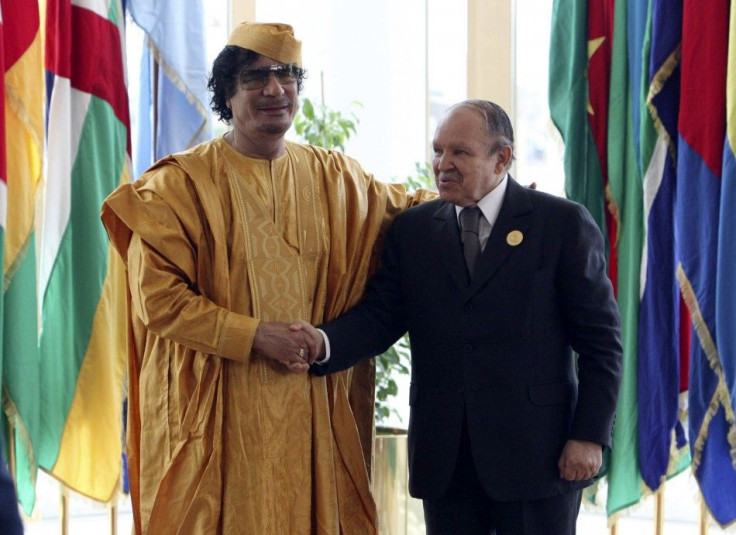Algeria’s spring starts in the newsroom

Algerians waged a roaring war against French imperialism in 1954. In 2011, it's among the quietest nations in the MENA region.
If an Algerian democracy movement exists today, it lives in newsrooms, according to the journalists bargaining with President Abdelaziz Bouteflika's administration for freedom of expression in emailed petitions and Facebook groups.
My family members died for the self-determination of the Algerian people [in the revolution], and I am still fighting for self-determination, said prominent Algerian journalist and free press activist Chafaâ Bouaiche.
Bouaiche's popular blog Algérie-Politique has launched campaigns to free imprisoned journalists and lambast media outlets acting as mouthpieces for the government.
Struggling to keep Algerian authorities honest, members of the press have been engaged in wart for press freedoms for nearly a decade. During that time, they have moved to repeal articles 144 and 144bis1 of the 2001 Algerian penal code threatening up to five years imprisonment for journalistic offenses, namely defamation-- a term without a clear-cut definition in the Algerian legal system-- of public officials and civil servants.
It's been a good year to make demands of the Bouteflika administration.
Hopped up on the scent of jasmine, Bouteflika appeared on state television in April, announcing new legislation to decriminalize press activity.
The announcement came after a mass-email circulated among Algerian journalists late last month, detailing a National initiative for the dignity of the press.
Behind the movement are members of the government's own official press organ, Algérie Presse Service (APS).
We just want fewer constraints in the accomplishment of our work and to be able to make a living with dignity, said one APS reporter charged with disseminating the email. He asked to remain anonymous for job safety.
The reporter said members of the initiative and the Ministry of Communications are still in talks.
President Bouteflika's new legislation has faced a mixed response from the Algerian press.
Until April, the 2001 Penal Code has meant a daunting journalistic process for Fatma Baroudi of Algérie News, a member of a Facebook group called For the decriminalization of journalistic offenses in Algeria, created in support of Bouteflika's recent measures.
Access to information has been difficult. With the penal code, the state has monopolized official information, and the journalist is expected to content themselves with information given by public institutions, she said.
If you write any kind of analysis-- anything different from the official information-- and if you don't reveal your source [to protect them], you risk doing time in prison.
The new laws may lessen Baroudi's risk, but the Committee to Protect Journalists (CPJ), a non-profit organization working to defend journalist's rights around the globe, is cautious in measuring the benefits of Bouteflika's recent speech.
It's difficult to tell how or to what extent things will change until the given laws are passed and implemented, said Mohamed Abdel Dayem, the CPJ's Middle East and North Africa Coordinator, adding that arbitrary detentions, beatings and harassment are common in Algeria.
Many Algerian journalists themselves are also calling this a token gesture to appease the Algerian public's thirst for democracy.
This decriminalization of journalistic offenses is a bunch of smoke in mirrors, said Fayçal Métaoui, senior reporter at leading independent newspaper El Watan.
Métaoui explained that even without the threat of imprisonment it's nearly impossible for a truly independent media to exist in Algeria, where starting a newspaper depends heavily on the support of the government.
There are so many newspapers in Algeria, all saying relatively the same thing, said journalist Bouaiche about the lack of diversity on the Algerian mediascape.
There is also some concern the ongoing changes will further enable censors.
Part of the initiative introduced by the APS reporter included a movement to adopt an official status for journalists, such that problems can be addressed by the responsible authorities.
Bouaiche and many other journalists say they believe the next step in President Bouteflika's policy on the Algerian press will be to adopt an official status for journalists and require them to obtain licenses, what he calls journalism cards.
I'm against the journalism card, Bouaiche said, It just makes it easier for the government to take it away when you say something wrong.
Métaoui expressed that international organizations like the CPJ should keep an eye on developments as they unfold to ensure Algerian journalists are able to do their jobs correctly, freely and with dignity.
Despite the potential fallbacks, Fatma Baroudi believes the emails and Facebook groups are a sign that journalists will continue to affect this decisive moment in the reformation of their media environment.
Many journalistic movements are regrouping today, although they are without a real platform, she said, But I think there will be a group that will come together to concretize a ground-plan and form a real pressure group.
© Copyright IBTimes 2024. All rights reserved.











